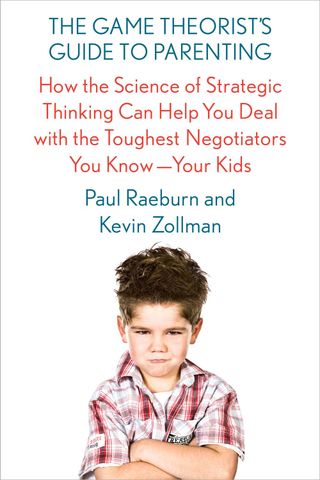
Siblings' Dilemma? Solve Backseat Bickering with Game Theory (Op-Ed)

Kevin Zollman, a game theorist and associate professor of philosophy at Carnegie Mellon University in Pittsburgh, contributed this article to Live Science's Expert Voices: Op-Ed & Insights.
As a parent, it might be hard to believe that anything could help resolve the unending conflict with your kids, especially not the ruminations of ivory tower mathematicians. However, it turns out that at least one area of scholarship, called game theory, may help put an end to the fights, the punishments that misfire and the contentious family decisions.
Game theory is the science of strategic thinking. While the name brings to mind a chess master or poker savant, this area of study deals with much more than what people ordinarily call "games." Although traces of game theory go back millennia, this study of strategy was invented as a field in the 1940s by mathematician John von Neumann and economist Oskar Morgenstern. At first, the theory was deployed to study military strategies in the Cold War, but it quickly blossomed into a general theory of social behavior.
Economists took it up to understand human decision-making, and biologists employed game theory to figure out the natural world. Today, fields as diverse as psychology, philosophy and computer science use the approach.
While game theory can sometimes use complicated equations and esoteric mathematical reasoning, its lessons can be communicated in plain English using everyday examples. My co-author, Paul Raeburn, noted parenting author and father of five, and I recently distilled the lessons of game theory into easy-to-use parenting strategies in the book "The Game Theorist's Guide to Parenting" (Scientific American/FSG, 2016).

For example, consider the game theory behind punishing and rewarding your kids. Everyone knows the story of Dad threatening to "turn this car around" if the kids won't behave. And everyone knows the ending: The kids ignore Dad's idle posturing. ['The Game Theorist's Guide to Parenting' (US 2016): Book Excerpt ]
Game theory has studied the nature of threats, going all the way back to the discipline's Cold War roots. The problem with Dad's threat is that it's not credible; he wants a vacation as much as the kids do. And the kids can figure that out.
Sign up for the Live Science daily newsletter now
Get the world’s most fascinating discoveries delivered straight to your inbox.
Mastering behavior
What drew me to game theory in graduate school was how it connected together seemingly different types of behavior under one umbrella. Game theory shows that a business threatening a price war, a dictator's nuclear posturing and Dad's ultimatum all fail for the same reason.
But a game theory approach to parenting involves more than recognizing obvious mistakes . Solutions in one domain can often be ported over to another. That's how Raeburn and I have approached the problem of punishment. We realized that game theory lessons from economics and political science can show parents how to design better strategies for getting their kids to behave.
Hopefully, punishing your kids will be only a small part of what you do as a parent. Game theory isn't all about conflict and punishment; it studies kindness, altruism and cooperation, too.
One classic game theory story, called the "prisoners' dilemma," shows how cooperation can sometimes be pitted against selfishness, and how you might get cooperation to win out at home. Here's the classic version of the story: Two criminals are caught red-handed committing petty theft. The police believe the two scoundrels committed something far more serious: a cold-blooded murder. Although the police are right, they don't have enough evidence to convict the murders; they need a confession. The suspects are taken into separate rooms and offered the following deal: Confess to the murder, and the police will drop the theft charge.
If one prisoner confesses and the other one keeps silent, the confessor gets off scot-free for both crimes, the murder and the theft. The police will let the confessor off for the theft, because the police will keep to their promise. The criminal will get off for the murder because if the other crook stays silent, the DA will give the confessor immunity so that he will testify against the accomplice in court.
On the other hand, if they both confess, the DA won't need anyone's testimony, so they'll both go to jail for the murder — they confessed to it, after all. Again, the police will keep their word and let both off for the theft charge if they confess.
So, here's the dilemma: If they both cooperate and keep silent, they both go to jail for theft and get away with murder. But each one is tempted to confess. Suppose one knows that his accomplice will keep silent. "If the other one stays silent and I confess," each one thinks, "I don't have to spend any time in jail. That's great for me." The decision here for a selfish criminal is clear: If the other person is going to stay silent, you should confess.
What's more, if the accomplice is going to confess, the criminal should confess, too. "If he confesses, I'm going to jail no matter what. But by confessing, I can at least get off for the theft charge." So no matter what the other person does, each prisoner does better by confessing.
Selfish reasoning leads both prisoners to confess, which makes them both worse off than if they had kept their mouths shut and cooperated.
This is great news for the police, which is probably why this strategy shows up in every procedural police show on TV. It is good police work, and even better drama, when a detective turns criminals' selfish tendencies against the suspects themselves.
But this conflict between self-interest and cooperation can also cause many a parenting headache. A child might selfishly grab a toy that another child wants. A little brother might opt to sit out the Saturday cleanup, leaving all the work to his big sister. And then there are those regular battles for backseat supremacy.

Some tips to get you started
Game theorists have investigated the prisoners' dilemma and found ways to get people to cooperate. One of the most effective methods for cooperation is to show your kids how they are playing the same "game" over and over.
If big brother sits out this week's cleanup, his sister will sit out next week. If he steals his friend's toy today, his own toy will get stolen tomorrow. By acting selfishly today, he encourages his sister to act selfishly tomorrow.
Parents can help kids cooperate by teaching them a strategy called "tit-for-tat." This might sound bad ("if you hurt me, I'll hurt you"), but it can also be good ("if you help me, I'll help you"). Parents can use this strategy to teach the moral of cooperation to their kids.
When trying to get your kids to cooperate with their friends, with their siblings or with you — the parents — using a little game theory can help to make everyday parenting tasks a little easier.
We're not advocating that you trick your kids into doing something they'll hate. Instead, game theory is about finding ways to interact with your kids that make everyone happy. That's the kind of outcomes we all want: win-win.
Game theory isn't a panacea; it can't answer every parenting question you'll ever have. But by utilizing the strategic wisdom of this field, you can help to reduce the frequency of those little conflicts that wear away at even the most patient parent.
Follow all of the Expert Voices issues and debates — and become part of the discussion — on Facebook, Twitter and Google+. The views expressed are those of the author and do not necessarily reflect the views of the publisher. This version of the article was originally published on Live Science.












